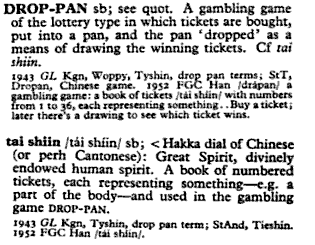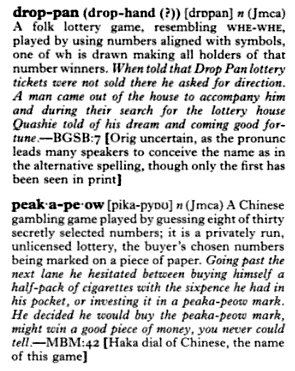
The game used to be called Drop-pan in Jamaica, now it is called Cashpot .
| # | Cashpot | DropPan |
|---|---|---|
| 1 | duppy | Ghost, milk, clothes, rice, anything white |
| 2 | small fire, batty | Anus, sitting, bed, crab |
| 3 | dead | Dead, duck, tongue |
| 4 | egg, sex | Egg, blood, wine, breast, sexual intercourse |
| 5 | thief | Thief, dirt |
| 6 | strong man, stone | Strong man, iron, running |
| 7 | married woman, hog | Married woman, hog |
| 8 | belly, hole | Belly, belly woman, hole, bag, ring |
| 9 | old man, old dead | Married man, cow, ol' dead, brain |
| 10 | small house, crib, coop | Small house, car, gaol, small boat, animal pen |
| 11 | boy, two legs | Boy, dog |
| 12 | head | Head, common horse |
| 13 | police, black woman | Knife, cutlass, policeman, butcher, old man, fisherman |
| 14 | mouth | Mouth, undertaker, wild puss, doorway |
| 15 | running, swimming | Weak, rat, running coolie woman |
| 16 | young girl | Young gyal, grass, tree, bees, anything green |
| 17 | old dead, chiney man | Chineyman, drapan player, gambling, brown man |
| 18 | doctor, doctor bird, doctor fish | Doctor, race-horse, tame puss |
| 19 | silver money | Silver, coolie man, hair, scale |
| 20 | sick | Sick, bed, food, meat, naked |
| 21 | bad girl | Whore, mule, bad |
| 22 | white woman | Nurse, white woman, pigeon, coffin, bird, queen |
| 23 | black man | Black man, monkey |
| 24 | fresh water | Fresh water, medicine |
| 25 | john crow | John crow, crowd, paper money |
| 26 | white man | White man, king, Jesus |
| 27 | big fire | Fire, accident, gun, madman |
| 28 | fowl | Road, fowl, pasture, commons, graveyard |
| 29 | parson | Parson, bull, ram, male of any species, right foot |
| 30 | fish | Fish, flowers, rum, mud |
| 31 | lizard, long stick, penis | Pulpit, kaki, wood, small rope |
| 32 | gold | Gold, ****, ripe fruit, beggar |
| 33 | big house | Big house, hospital |
| 34 | baby | Gyal-baby, soldier |
| 35 | goat, vagina | She-goat, ******, bible |
| 36 | old woman | Hong Kong, foreign country, old lady, donkey |


1953, Mr. Samuel Kong with his wife, Wong Fong Yin, and their eight children. Courtesy of the Kong family.
By this time, in the 1940s, many of the second-generation, those who were truly Jamaican-Chinese, began to rebel against their parents' desires to remain wedded to Chinese culture. They left the family business, went into other professions and embraced aspects of Jamaican culture. Many also converted to Roman Catholicism. Resentment from African-Jamaicans waned as tolerance of aspects of Chinese culture grew and some amalgamations occurred.
One of the most notable examples is the numbers game "drop pan." Drop Pan in Cantonese "Jih Fah" and Hakka "Sue Fah," is named for the fact that tickets numbered 1 to 36 are dropped in a pan to see who wins. Many players play based on dreams and portents, although some play by odds based on a study of the pattern of play. Drop Pan is said to have arrived in Jamaica with the earliest Chinese immigrants in the 1850s. It was restricted by the government as early as 1898. This law was amended in the 1920s due to the game's substantial popularity.
Today, drop pan's meanings are most likely both Chinese and Afro-Jamaican in origin. According to Barry Chevannes in a Jamaica Journal article on Drop Pan,
"the number 7 means married woman and hog. In Chinese custom a son-in-law makes a gift of a pig or pork to his mother-in-law every New Year.
The number 11 means baby boy and dog. Among the Chinese, the dog is a blessing as are newborn males".
The number 8 stands for belly, belly (pregnant) woman, hole or ring, all of which could be related to Rastafarian belief that "a woman has no lineage. A woman is only a vessel".
Peaka pow is a South Chinese gambling game based on number series which are changed every week. It is so complicated that only a Chinese can manage to keep track of its weekly permutations and....
the AG went on to state:
l have known of similar games in other Colonies under different names such as "Drop Pan" and the more oriental name of "Peaka Pow", but l must say that the ethics of those games are on a much higher standard than those of whe whe, for at least those who contribute are given a sporting chance (however remote that may be) of some success, but the game as played here has no redeeming feature whatever, l am sorry to say. lt is impossible to control those who promote the game, and they are so able to manipulate the winning numbers
that they choose those on which there has been the least amount of contributions, and by that way they are able to retain by far the largest amount of money involved.
Those who go about soliciting subscriptions, commonly called "markers", have a very wide latitude.
They get somebody to choose a particular number, and if per chance this happens to be the winning number the marker goes back to his friend and says "l am very sorry. l was too late". As a matter of fact he is never too late but ...
More popular among women are the street corner games, peaka-peow and drop-pan, both Chinese numbers games. Drop-pan. where even a five cent bet may be placed, underlines the precarious financial position of many Selton Town
DROP PAN Folk lottery brought by CHINESE immigrants, an illegal game that is still played though not as widely as it once was. This is a numbers game: books of tickets numbered from 1-36 are sold by vendors working for the 'banker' who is the person running the game. Each numbered ticket sold is dropped into a pan for the draw, each draw or play being called a 'pan'. All holders of the number drawn become winners. Each number is assigned a special meaning or several meanings ('mark'), some originally brought from China, others developed in Jamaica, eg the number 1 signifies 'white', 18 'doctor', and so on. Purchases are therefore often based on dreams, guesses, signs ('rakes'), or TOKENS of the number or symbol, and Dream Books are sometimes consulted. Drop Pan is also called Tyshin and Woppy and in other parts of the CARRIBEAN, Whe-whe. The game is still popular in the DANCEHALL-environment, with specially coded meanings assigned to the numbers.
PEAKA-PEOW Gambling game introduced and run by the CHINESE, like DROP PAN, once very popular - though illegal. From a paper with 120 numbers, 30 are secretly chosen by the throw of a dice; the player marks 8 numbers on a piece of paper and wins if any of these numbers correspond to any of the 30 chosen.
drop-pan : a national numbers game
Another game is known as drop-pan from the method of play. One buys from a book of tickets (/tai shiin/ is the Chinese name by which this generally goes) numbered from 1 to 36, each ticket representing something — for example, a part of the body. Later the tickets are dropped in a pan to see which wins. A rake is a 'hunch' — a sign or token that guides one in buying a drop-pan ticket. The person who feels he has got this token may say, 'I ketch de rake.' Money Jamaica has adopted or developed a number of names and nicknames for coins